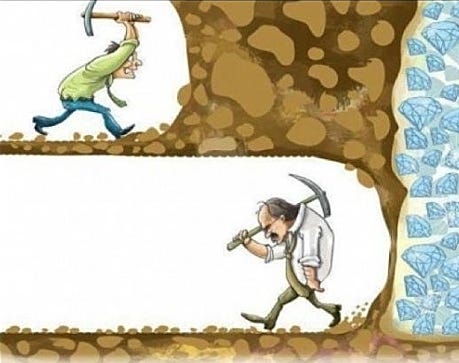This Skill Is Highly Underrated, But Critical For Long Term Success 👇
"Never Quit" is terrible advice.
“Never quit!” is popular motivational advice. Unfortunately, it’s as misleading as Trevor Milton.
Like with most things in our world, there’s a lot of nuance. When it comes to high-achievement, knowing when to quit and pivot is critical. We’re only given so much time; we should minimize the time on paths incompatible with our purpose and dreams.
In May of 2018 I was on a Zoom call with fellow company owners discussing a potential new strategy. The most important thing to come out of that call was clarity that I was on the wrong path with the wrong people; something I should have realized years earlier.
Before going on, a quick preface:
The following is for those of you that are already playing full-out, not the flighty, jump-at-every-shinny-object person.
Just as we shouldn’t quit because we had a bad day or because things are difficult when we start, we also shouldn’t stick with something just because we’ve put a lot of time and effort into it.
Up to that point in 2018, I had invested over 11 years into that path with those same people. In economics there’s a concept called Sunk Costs — costs that have already been incurred and cannot be recovered. The 11 years were a sunk-cost. The idea of quitting turned my stomach as much as the thought of eating lima beans as a kid. I was taught that winners never quit. I was convinced that the diamonds were just a few feet further in the mine and that I needed to keep digging.

For years I was a living example of the Sunk Cost Fallacy. I continued along the path because I had already invested so much into it. I couldn’t handle the thought of walking away from something I had invested so much into.
It darn near took a grenade to blow a hole in that crappy thinking.
Going forward I’ve found a strategy that helps me thread the needle of when to quit and when to keep going.
Reasonable results from a reasonable amount of effort, in a reasonable amount of time, or something must change.
Before embarking on a new journey, I recommend asking these questions and doing some research. You must resist the the urge to explain away time or effort by telling yourself that you’re above average. You may well be, but for setting a reasonable time and amount of effort, you need to go off the averages.
What are reasonable results someone can expect from this endeavor?
What kind of consistent effort is required to achieve those results?
What skills do I need to master?
What’s a realistic time-frame to achieve those results given the average?
If done objectively, this gives you a clear roadmap against which you can weigh your results. I recommend breaking it down further into checkpoints along the way to track your progress. Understand, though, that the results may not grow linearly with time.
When you feel like quitting, revisit your answers to the questions. Have you done the work necessary? Have you mastered the skills? Have you applied them consistently and for long enough?
If not, the change you need to make is internal.
If so, then the change may need to be external — fix the path if you can or find a new one.
There’s only one thing you should never quit, and that’s pursuing your dreams and purpose.
P.S.: Don’t let any fake you out with sayings like, “Quit to what?” as if the path your on is the only legitimate path.
FB Live 🎥:
A Simple System For Brainstorming Quality Content 🧠 💭 (Link)




